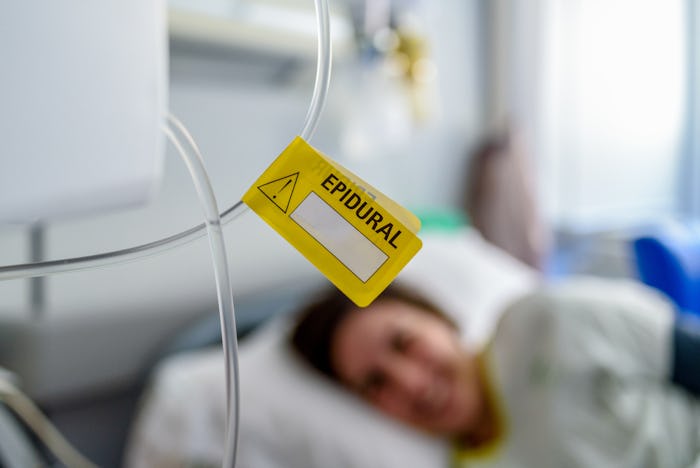Life

Here's How An Epidural Really Impacts Your Blood Pressure During Labor
Everyone knows that medical procedures have risk. It's the nature of the beast that even routine interventions can have unintended consequences. While many of the risks and side effects of certain popular procedures — like an epidural — are well known, there are myriad other potential repercussions that most of us never realize. In the case of an epidural procedure, the risks are real, but they're so far outweighed by the benefits that we don't give them much consideration, so if they occur, we're caught off guard. Take for instance, hypertension. Does an epidural increase blood pressure? If so, what does that mean for mother and child?
There is a great deal of misconception on child birthing forums surrounding the myth that having an epidural placed will trigger a spike in blood pressure. This seems to be borne out of cases wherein the mother was being induced due to an already hypertensive state and the risks that occur along with that diagnosis. The women on these forums are (understandably) concerned that receiving an epidural will exacerbate this condition. Thankfully for these women, this should not be a concern. According to the American College of Obstetricians and Gynecologists (ACOG), an increase in blood pressure is not a known side effect of epidural anesthesia, and as per the Cochrane Library, epidural therapy is considered a possible treatment for hypertension.
The finer points of the relation between epidural and blood pressure are a bit more complicated than "yeah, no, don't worry about that." I spoke with Dr. James Lozada, Assistant Professor, Vanderbilt University Medical Center, Department of Anesthesiology and asked him if an epidural could cause you to have high blood pressure. He was quick to answer in the negative, much to the relief of pregnant mothers everywhere. "A labor epidural does not raise blood pressure. In fact, low blood pressure following labor epidural placement is a common side effect," he says. From my experience, this can be fairly jarring in how fast it happens, but also how quickly they're able to resolve it. It's a bit of a wild, vertiginous experience, but it didn't cause me any pain, and it was over as quickly as it began.
Lozada continues, "Obstetric anesthesiologists prepare for this possibility by giving mothers extra IV fluid and having medicine available to increase blood pressure, if needed. This is aimed at keeping the mother’s blood pressure normal, which means her baby stays happy."
However, Dr. Lozada understands that there are instances during childbirth that raise maternal blood pressure, and therefore might make moms think that the epidural and elevated blood pressure are related.
"Several pregnancy-related factors may increase a mother’s blood pressure. These BP increases may happen at any time during pregnancy and labor, including during epidural placement. However, they are due to the pregnancy and labor process, not the epidural itself," he explains. For instance, just the act of experiencing pain increases your blood pressure. Having had one unmedicated birth and one with fantastic pain relief, I can tell you that my pressure was far higher with the tremendous amount of pain I experienced than during the labor I didn't feel. That being said, I did notice a spike when the drugs wore off.
Lozada also comments that women with gestational hypertension — elevated blood pressure associate with some pregnancies — chronic hypertension, and preeclampsia might see a spike in their blood pressure during the labor process, but that it's expected, and it's usually treatable. Preeclampsia is worrisome because it can lead to seizures, but modern research is continually improving outcomes for women who suffer from the condition.
Labor and delivery is scary, but thankfully, hypertension related to your epidural is one thing you can stop worrying about. And if you're worried about your BP getting too high during labor, an epidural may be just what your body needs.